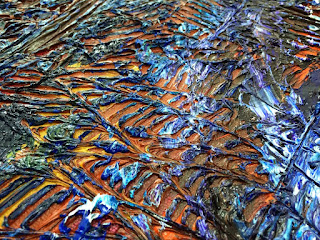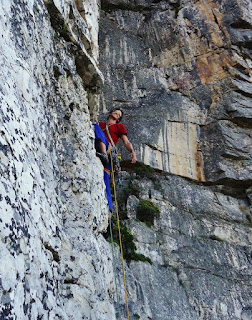Trev
A couple of years ago I made a big shift in life style. I decided that the things that mattered most to me were spending time with people I cared about, learning to care about more people, and learning more about the world we live in. All these things were incredibly cheap. Having been involved in Finance, I had spent a lot of time thinking about saving and investing to have enough. There is the other side of the equation too. The less you need, the less you need. I have several friends who realised this earlier than me. One of those was my digs mate when I lived in Cape Town. His name is Richard Halsey, but like a character from Friends, to me he will always be Smelly Pom.
Rich up a Rock
Rich
While I don’t know all the details of Trevor’s new life journey, I am so glad to hear it. I remember when we shared a house, he put in huge graft for his actuarial studies but seemed far more comfortable throwing paint at a canvas. This is a manifestation of a trap that our economic system sets up: being a wage slave while you are young and fit so that you can have freedom when you are old and tired. I have never quite bought this story, and have felt the most free while living in a tent on a beach, eating food discarded by supermarkets.
Life in Colour
Trev
You were always more flexible on the expiry dates than me! I can remember you rescuing food as it was heading in the general direction of the trash. I also always thought I had an expiry date on my studies. I figured it was better to make Art a hobby and Maths a career, than the other way around. I broke my back studying. Unfortunately I think I also didn't put as much time as I would have liked into people. It was a priorities thing. I think if we stepped back more often, and were in less of a rush, we would see that fighting fires turns us into fire fighters.
Rich
There are certainly times when we need to knuckle down and focus. These are phases in life, and they facilitate progress. Many of my friends now have young children that require sacrificing personal time, but investing in family is worth it. I feel the problem is when the focus becomes monetary wealth at the loss of relationships and fulfilling activities. Is obsessing about Rands and cents worth missing out on hugs and laughter? I am not advocating being penniless, but ensuring that you do make generous space for the things that really do matter to you. If that means getting a smaller pay check, I doubt you will regret it in the long run.
Trev
I used to think of it as 'eating my vegetables'. When I was little, we only got pudding if we finished all our vegetables - peas, carrots, gem squash, spinach etc. I have always been wired to do the hard stuff first. Delayed gratification and all that jazz. The balance comes in how much you 'put off life till later'. I was speaking to a Medical Student today and she was talking about putting her life on hold for 13 years. I could identify. The thing is, both my brothers are Doctors, the studying doesn't stop. Ever. Doing the hard stuff can become a habit. I was recently introduced to the idea of being a 'half hearted fanatic'. There need to be gaps. The journey is more important than the destination.
Rich
This reminds me of a shirt I have from a street artist which reads: “Life is a journey, not a destination”. I wear it a lot as I believe the message is important. This also links to the concept of working hard and playing hard. That way you can make achievements in work and pursue you passions if they are not the same thing. However, after years of this I found it resulted in burnout. So while I fully support balance, my Libra is currently leaning more toward the pudding than the vegetables. It would be a waste of ice cream if it never got eaten because I snuffed it the day before retiring from a life of nine to five.
Rich enjoying the journey
Trev
It would definitely suck if everything was just preparation. School for work. work for retirement. Retirement for death. I get the need for balance between the moment and the future. The challenge comes in how we set our priorities. Emotionally, I think it takes enormous training to prioritise correctly. Not to be seduced by our success so that we pour all our energy into things that are important, but aren't all important. Somewhere between recognising our desires, and directing them lies a sweet spot. A fuzzy zone of flow. Of well being.
Rich
Exactly! This is where it is at. This flow space can be hard to find, but once you are in it, you will feel right. For a time at least. Life is not static. The balance you want, or need, will change through the years. Just be aware of it, and open to it. Having said this, I do feel that a pervasive capitalist culture makes it harder to find this balance. It can take courage to break from the norm, and before you do, make sure you have the means to do so. To get what you desire, you need a plan, which you revise as required.
Trev
I like the idea of working for flow, rather than working for money. The truth is that I am very much a capitalist though. In the sense that I think capital should do the work since capital works better with ideas of supply and demand. Labour (i.e. people) works better with flow, creativity, empathy, sharing and giving. In my Utopia we would all be Social Capitalists. The Capital would pay out a Universal Basic Income which would be our muse. We could then spend our time on warm fuzzy stuff. Or with each other. Or working hard on something we are passionate about. I actually think this might be more than a pipe dream. An Artificial Intelligence worth its salt would see the potential lying untapped in most people.
Rich
Well, until we reach one Utopia or another, the best we can do now, is make the most of it. Whichever way you choose to play the game, do so in a way that resonates with who you aspire to be. We will all check out some day, and you can’t take material goods across the river Styx. Laughter and love are free, cars and houses generally aren’t. You see, money is only a tool: it can both improve and destroy lives. So use it wisely. Time is finite, so use that wisely too. You can always earn more dollars, but you can never buy back wasted hours.





























